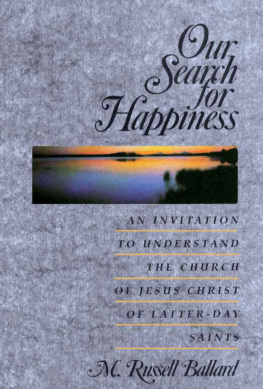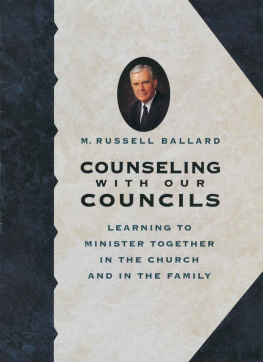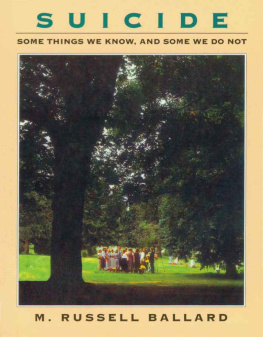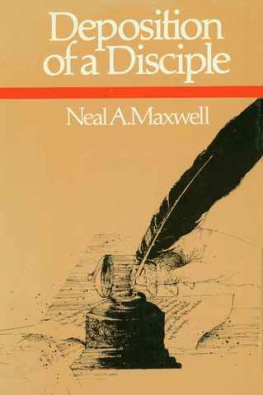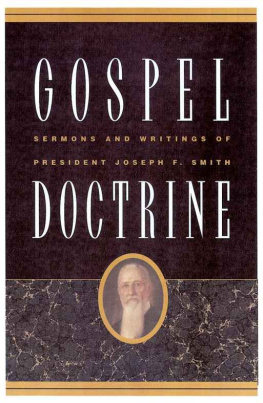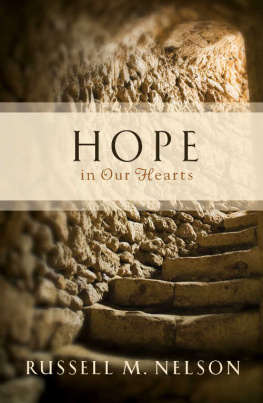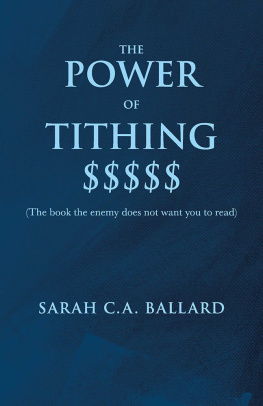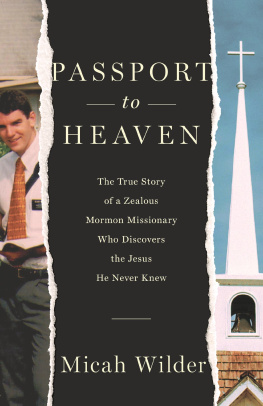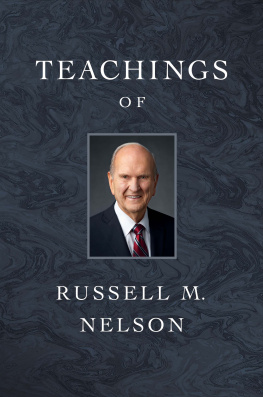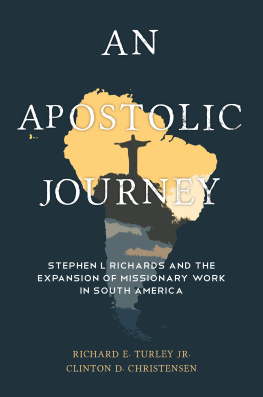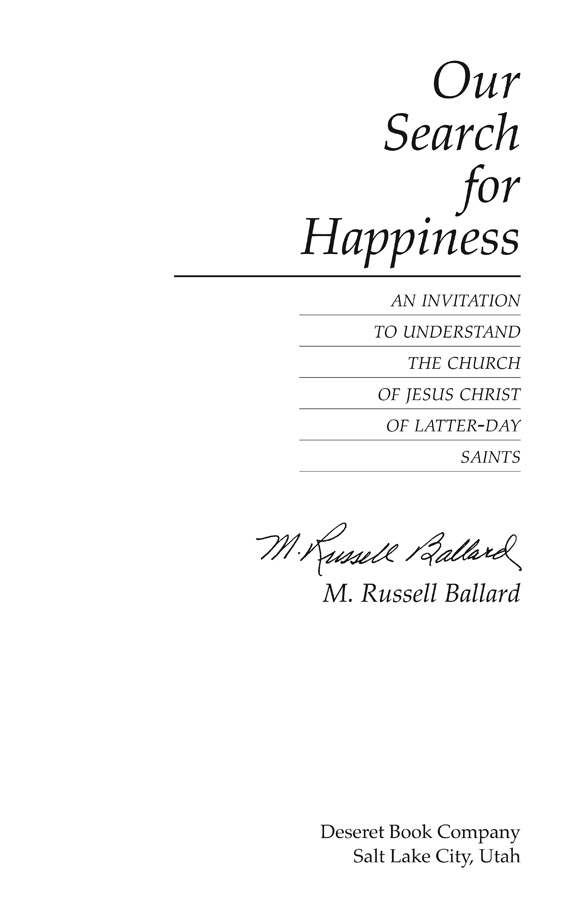1993 M. Russell Ballard.
All rights reserved. No part of this book may be reproduced in any form or by any means without permission in writing from the publisher, Deseret Book Company, P.O. Box 30178, Salt Lake City Utah 30178. This work is not an official publication of The Church of Jesus Christ of Latter-day Saints. The views expressed herein are the responsibility of the author and do not necessarily represent the position of the Church or of Deseret Book. Deseret Book is a registered trademark of Deseret Book Company.
1993 M. Russell Ballard
All rights reserved. No part of this book may bereproduced in any form or by any means without permission in writing from thepublisher, Deseret Book Company, P.O. Box 30178, Salt Lake City, Utah 84130.This work is not an official publication of The Church of Jesus Christ ofLatter-day Saints. The views expressed herein are the responsibility of theauthor and do not necessarily represent the position of the Church or ofDeseret Book Company.
Deseret Book is a registered trademark ofDeseret Book Company.
Visit us at DeseretBook.com
Libraryof Congress Cataloging-in-Publication Data
Oursearch for happiness / M. Russell Ballard.
p. cm.
ISBN-10:0-87579-804-7
ISBN-13:978-0-87579-804-2
1.Church of Jesus Christ of Latter-day SaintsApologetic works.
2. Church of Jesus Christ ofLatter-day SaintsDoctrines.
3. Mormon ChurchApologeticworks.
4. MormonChurchDoctrines.
I. Title.
BX8635.5.B35 1993
230'.9332dc20 93-29353
CIP
Printed in the United States of America
Publishers Printing, Salt Lake City, UT
10 9 8 7 6 5 4 3 2
Tomy wife, Barbara,
ourchildren, andtheir families
Acknowledgments
This bookhas been a long time in the making, and I am indebted to a number of people whohave encouraged me and who have contributed to this project in some way. Manycolleagues and friends read the manuscript at various stages and madesuggestions that strengthened the material significantly. This book is muchbetter because of their contributions.
I amparticularly grateful to a number of men and women representing other faithswho willingly read this manuscript. Their reactions and feedback wereinvaluable in helping me make sure that the message of this book is clear,understandable, and, I hope, not offensive.
Whileit's always dangerous to single out individual efforts, I greatly appreciate mysecretary, Dorothy Anderson, who was tireless in pulling together materials anddoing research. Joe Walker's assistance and consultation helped me push theproject along. Ron Millett, Eleanor Knowles, Sheri Dew, Kent Ware, and PatriciaParkinson at Deseret Book encouraged this project from the beginning and helpedturn a manuscript into a finished volume. And I am likewise grateful to mywife, Barbara, for her patience and loving encouragement.
Despitethe contributions and suggestions of many, I alone am fully responsible for thecontent of this book.
Beginningto Understand
Introduction
Consider for a moment the word understanding.
It's a simple word, reallyone that most of us use everyday. But it means something that is quite remarkable. With understanding we canstrengthen relationships, revitalize neighborhoods, unify nations, and evenbring peace to a troubled world. Without it chaos, intolerance, hate, and warare often the result.
In other words, misunderstanding.
If I had to pick one word to describe my objective in writingthis book, it would be understanding.More than anything else, I would like those who read thesepagesespecially those who are not members of The Church of Jesus Christof Latter-day Saintsto better understand the Church and its members.That doesn't necessarily mean that my goal is to have every reader become amember of the Church, or even to accept our doctrines andpracticesalthough I would be less than honest if I did not acknowledgethat I would be pleased to see those things happen. But that isn't really thepurpose of this book. This book is about comprehension and understanding, notconversion. It has more to do with building trust, appreciation, and respectthan it does with increasing church membership.
And that understanding should begin with usyou, thereader, and me. In order for you to understand me and my point of view a littlebetter, you might want to know that I came into the world at about the sametime as the Great Depression, which means that I grew up during a time whenthings were even tougher and more challenging economically than they are today.I watched my parents struggle to make ends meet, and I was affected by that. Iattended public schools, went to college, met and married a wonderful woman,Barbara, who is the mother of our seven children. Professionally, my interests followedthe real estate, investment, and automobile industriesincluding owning adealershipuntil I was called in 1974 to serve as a full-time missionpresident and ecclesiastical leader of The Church of Jesus Christ of Latter-daySaints. Together as a family we've experienced good times and bad, success andfailure; and we've known our share of both happiness and sadness.
What about you? Most likely we've never met, and yet I'mconfident that we have a great deal in common. You are probably concerned aboutworld events. You worry about conflict between nations and within individualcountries, economic and social stability, and political turmoil. Perhaps youhave dealt with serious illness, a reversal in fortune or unexpecteddisappointment, unemployment or the death of a loved one, and the pressure hastaken its toll on you physically, spiritually, and emotionally. Your family islikely the most important thing in the world to you. Assuming that is the case,there are no doubt times when you look at the way things are going in the worldand fear for the future of our children and grandchildrenin fact, forall of civilization as we know it.
So do I.
When it comes right down to it, people are quite similar. We maycome from different backgrounds, cultures, and economic circumstances, and ourattitudes and perspectives may vary. But in the heartwhere it reallycountswe're a lot alike.
An acquaintance of mine was visiting in the home of a businessassociate in another country. They had enjoyed a fine meal together and weresharing some pleasant conversation when the other man's teenage son burst intothe room more than an hour after he was supposed to be home.
"I don't speak any language other than English," my friend toldme while describing the experience, "but I was able to follow that short, tenseconversation almost word-for-word: The father asked if the boy had any ideawhat time it was. The boy said he didn't know. The father asked if the boyremembered what time he was supposed to be home. The boy said he couldn'tremember. The father asked where the boy had been. The boy said he'd been'around.' The father asked why the boy had been so late. The boy said he losttrack of time."
Finally the exasperated father dismissed the boy and turned hisattention back to my friend. "I am so sorry," he said, and started to explain.But my friend stopped him.
"No explanation is necessary," my friend said. "I understandperfectly."
The man looked at my friend with a puzzled expression on hisface. "I thought you didn't speak our language," he questioned.
"I don't," my friend told him. "But I do speak 'Parent.' And I'vehad that very conversation with my own teenagers at least a dozen times."

